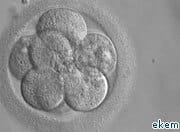The fertility watchdog has advised the Government to allow the creation of three-parent embryos, amid concerns about future genetically modified children.
The Human Fertilisation and Embryology Authority (HFEA) advised the Government to allow a technique that would create babies with two genetic mothers and one genetic father.
But leading scientists and ethicists have warned about the potential to dehumanise and commodify relationships between children and parents.
Illegal
Supporters claim the technique, which is currently illegal, could eliminate mitochondrial disease, a genetic condition passed from mother to child.
More than 40 ethicists from the UK and abroad, have written to The Times newspaper raising serious concerns about future genetic modification of children if the technique is made legal.
They said: “It would be the first time such intentional genetic modifications of children and their descendants were expressly permitted and would open the door to further genetic alterations of human beings with unforeseeable consequences.”
Dehumanising
And thirteen doctors and professors in the field of genetics or bioethics wrote to The Guardian newspaper warning that the move “risks dehumanising and commodifying relationships between children and their parents.”
They said: “In our view, the benefit for a relatively small number of women of being genetically related to their child does not nearly justify the potential health risks to the child and the deleterious consequences of inheritable human genetic engineering.”
The HFEA claim a consultation on three parent embryos was broadly supported by the public.
Ministers
The HFEA advice has been passed onto ministers.
Making three-person IVF legal does not require a new act of Parliament, but would require a vote in both the Commons and the Lords.

